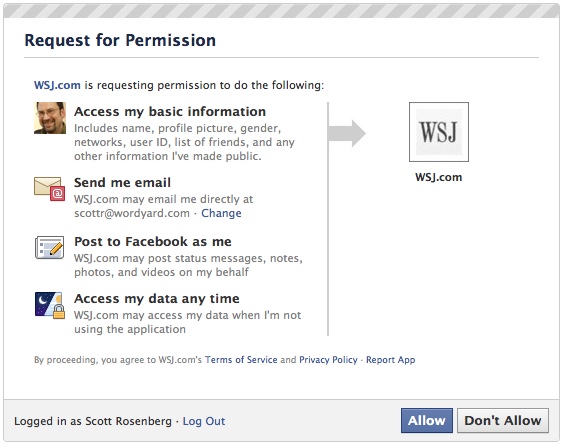I read about WSJ Social, the newspaper’s experiment at providing a socially driven version of itself entirely inside Facebook, and thought, hey, I should check it out. So I Googled “WSJ Social” and clicked on http://social.wsj.com. Since my browser was already logged in to Facebook, I was immediately confronted with a Facebook permissions screen. I captured it above for posterity.
Here is the problem: All I want to do is see what WSJ is up to. I might or might not actually want to use the product. But before I can proceed, here is what I’m asked to approve:
(1) “Access my basic information — Includes name, profile picture, gender, networks, user ID, list of friends, and any other information I’ve made public.” Well, this stuff is public already, right? I think I can live with this.
(2) “Send me email — WSJ.com may email me directly…” Hmm. I’m not eager to add to my load of commercial email and there’s no indication of the volume involved. But I’m not hugely protective of my email address — you know, there it is in the image above — so I guess this isn’t a dealbreaker.
(3) “Post to Facebook as me — WSJ.com may post status messages, notes, photos, and videos on my behalf.”
Excuse me? You want to do what?
Forget it, NewsCorp. Ain’t happening.
Now, I fully understand that the app may be up to nothing terribly nasty — some or most of what it wants to do may be routine back-end stuff. But it doesn’t provide me with any confidence-building information. Tell me, WSJ Social: How often are you going to post under my account? And what kinds of messages are you going to send? How will I know you’re not going to spam my friends? How do I know the WSJ’s rabid editorial-page id won’t start posting paeans to Sarah Palin under my name?
Facebook permissions screens may have become as widely ignored as Terms of Service checkboxes and SSL certificate warnings. But the notion of the Journal (or anyone else) insisting on its right to “Post to Facebook as me” before it will even let me examine its news product is simply ridiculous.
UPDATE: On Twitter, WSJ’s Alan Murray responds: “Not going to happen. Standard permissions in order to allow WSJ Social to share stories you ‘like’ with your friends.”
Post Revisions:
- January 5, 2012 @ 10:54:50 [Current Revision] by Scott Rosenberg
- September 24, 2011 @ 09:04:50 by Scott Rosenberg
- September 24, 2011 @ 03:48:06 by Scott Rosenberg

